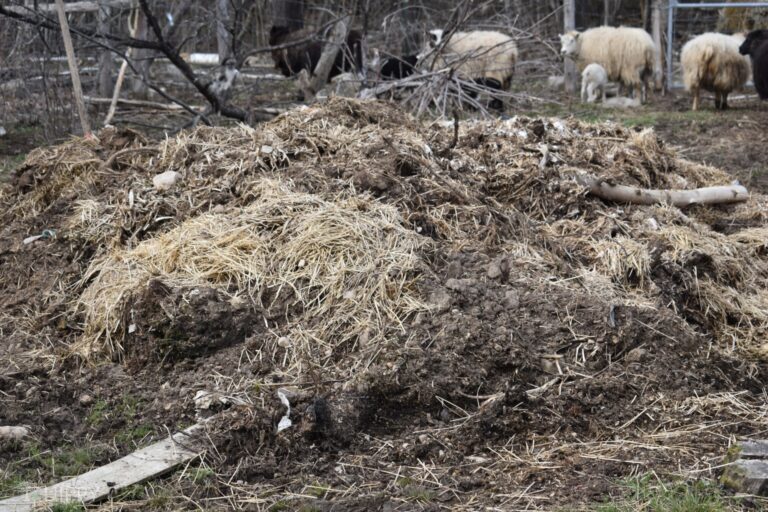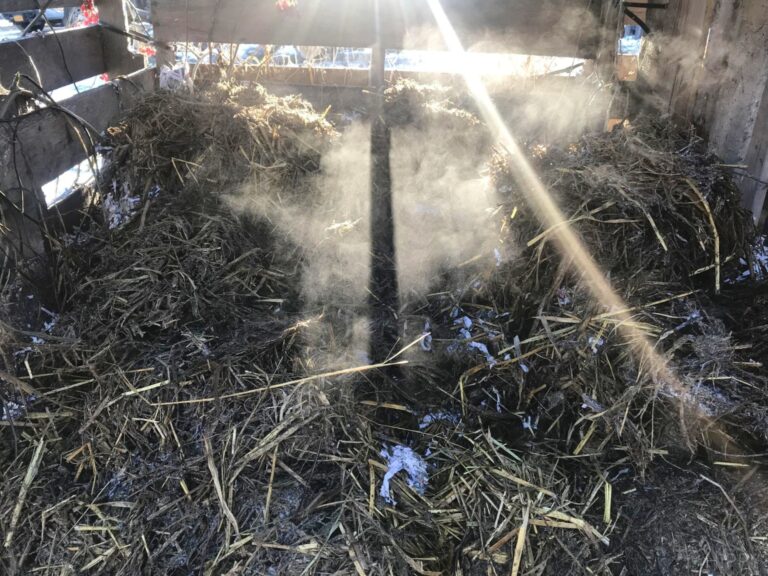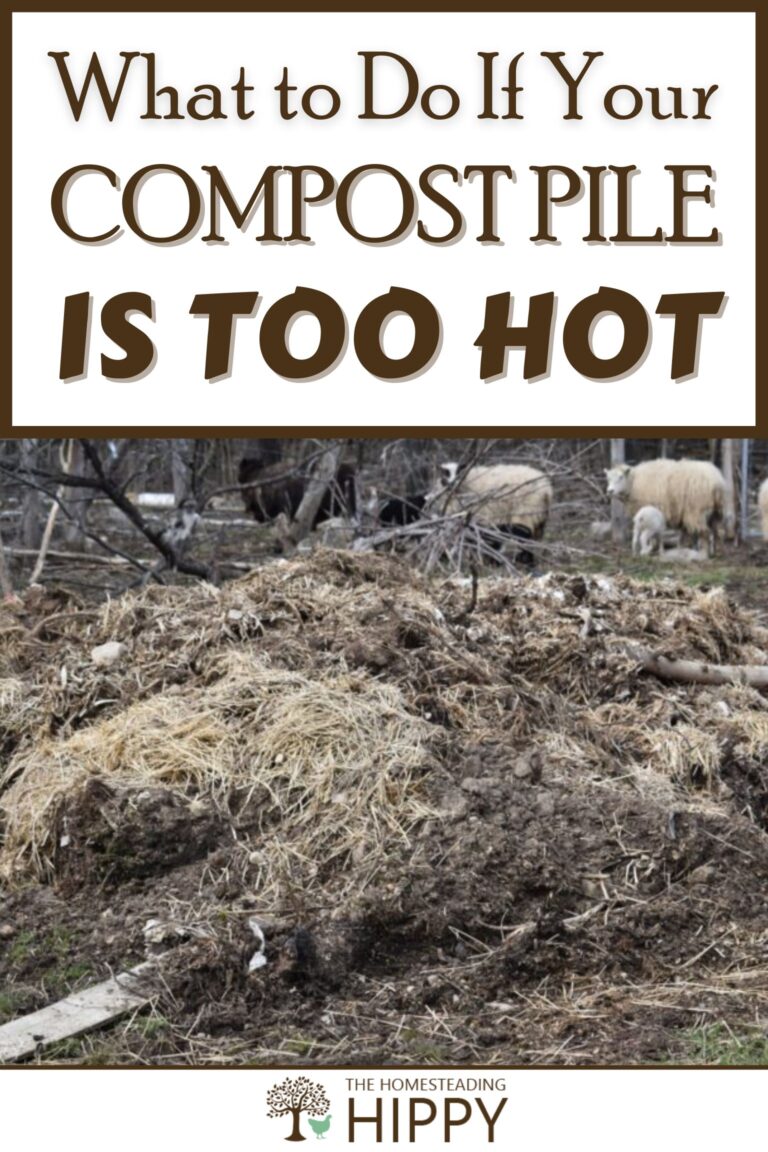Composting is one of the very best things you do if you have a garden or grow any other plants around your property. Compost is packed with all of the essential nutrients that your plants need to grow healthy and strong.

Best of all, it’s basically free, made from scraps and waste that you’d normally throw away.
It’s an excellent way to help your plants, yourself, and the environment by turning would-be trash into something useful.
But composting takes work, and managing your pile is an involved process. Heat management is one of the trickiest parts of tending it: if your compost pile gets too hot, it can easily kill the beneficial bugs and bacteria that are doing all the work.
The good news is that overheating is pretty easy to notice and to stop so long as you are paying a little attention. This article will tell you how.
Does a Compost Pile Really Get Hot?
Yes, and quite hot! The composting process is actually a controlled form of decomposition. The bacteria and other organisms that are breaking down the material in your pile generate heat as they work.
How Hot Does it Get?
A well-managed compost pile can reach temperatures between 131°F and 170°F easily.
Pretty piping hot, eh? But don’t worry, those temperatures are only temporary. The pile will cool down again as the organisms finish their work and the material they’re breaking down is used up. Finished compost is cool to the touch if not warmed by the sun.
Your Compost Will Actually Steam in Cooler Weather!
Compost gets surprisingly hot, and hot enough to actually emit visible steam in cooler weather. This is perfectly normal. If you see steam escaping from your compost, it just means that the process is working as it should.
How Hot is Too Hot?
Your compost pile will not just top out around 170°F (76°C). If the conditions are right, it can go much hotter. Your compost can easily reach temperatures in excess of 200°F (93°C) if mismanaged or in hot, dry climates.
Anything over 170°F is a big problem and you’ll need to act fast.
Why Do You Need to Act if Your Compost Gets Too Hot?
Too hot compost is compost that is going to fail. If you wait too long, the heat will start to kill beneficial bacteria and insects, which are essential for the composting process.
This will slow down or even halt the process entirely until these bacterial colonies and insects can be reestablished or reintroduced, respectively.
In some rare circumstances, an overheated compost pile could even catch fire. More on that in a bit.
Here’s What You Should Do When Your Pile Gets Too Hot
You don’t need to panic if you think your compost pile is too hot. Just take prompt action and you should be able to cool it off and stabilize it. Do the following:
1. Check the Temp
Before you do anything else, check the temperature of your pile. Don’t assume, don’t just feel it out or guess. Check it! To do this, you should use a compost pile/bin thermometer.
These are analog or digital thermometers with long metal probes. Stick the probe into the center of your compost pile and leave it there for a few minutes before checking the reading.
For very large piles, take multiple readings at different points for an accurate picture of whether or not you have a hot spot or a hot pile.
Look for a temperature of around 131°F to 170°F at most. If the temperature is anything above this, you have a problem that needs addressing. Follow the rest of the steps.
2. Is Your Pile in Direct, Full Sun?
Compost piles need some sun, but too much will contribute to overheating in most climates.
If your pile is in direct, full sun all day long, it will heat up far more quickly than one in partial sun or in the shade. If this is the case, find a way to provide some shade for your compost.
You can do this by moving the pile to a shadier location or by covering it with a tarp, netting, or something similar depending on your needs.
You might not have any problems except that the pile could be getting too much direct sun. Assess before you move on.
3. Turn it Well and Mix
The very first thing you should do in response to an overheated pile is to turn it. This will help to aerate it and move the hotter material on the inside to the cooler stuff near the edges, dissipating some of the heat by distribution.
Make sure to mix it up while you are at it to help prevent hotspots which can sometimes arise when the various components are not thoroughly integrated. Too many nitrogen-rich components in one place can easily lead to overheating in the right conditions.
4. Add a Little Water
While you are turning the pile and mixing, take a moment to add a little water. This will help to bring down the temperature of the pile further and hopefully stop it from spiking in the future.
Overheating usually leads to significant loss of moisture, and if a pile is already very dry you can lose your microorganisms and insects quite easily.
However, pay attention to what you are seeing. If the pile is visibly moist enough, give it just a spritz of water to help cool it. You only need to add a little water in such cases. If it is dry, then definitely add more.
You never want your pile to be too wet, as that can actually promote anaerobic conditions which will ruin the compost and turn it into a smelly, slimy mess. Use your head, and only use enough water to do the trick.
5. Add Some Cool Material
You can further cool your pile and boost it at the same time by adding fresh, cool material. This is usually accomplished by adding more of what you usually put in your pile, or even fresh manure from herbivores.
This will help to bring down the temperature while also providing a shot of nitrogen which can sometimes be lacking if your pile has been too hot for too long.
You could also add some finished compost to your overheated pile if you have some on hand. This will also help to cool it while also jumpstarting the process again with some already decomposed matter.
6. Add Carbon (Browns) if Necessary
A nutrient imbalance in the pile can lead to runaway temperature increases. Consider what your pile is lacking.
If overheating is a chronic problem, you probably need to add more brown material. This will help to regulate the temperature and provide some stability.
Chipping up larger pieces of woody material can also help as it will increase the surface area for decomposition while also making it easier for oxygen to penetrate which will help to keep things from getting too anaerobic. Bark, small chunks of wood, wadded paper, and so forth are all good options.
7. Keep an Eye on Things
Once you have done everything on this list, your pile should be back under control, temperature-wise.
But don’t get complacent! You should check and re-check your pile every few days to make sure it isn’t starting to overheat again.
If it is, work on it, but this time you should look deeper into adjusting the levels in the pile or splitting it into two piles. There may be a significant imbalance or else it is just a bit too big.
Overheating is not the end of the world, but it can definitely be a setback. By taking proactive steps, you can keep your compost pile healthy and productive for the long term.
An Overheating Compost Pile May Catch Fire!
You might have heard stories about compost piles catching fire. It’s true! This is not an urban legend, but it is thankfully quite rare.
If your compost pile is extremely hot, dry, and has the right mix of materials, it could theoretically catch fire if it overheats.

As mentioned above, if you look out on a crisp morning or evening and see the haze over your pile, it is likely just steam, not smoke.
That being said, don’t take it for granted, especially if you live in a dry climate and very especially if you have already had overheating issues.
Keep Your Compost Cool and Under Control
It’s never good when your compost pile starts overheating, but with a few simple tricks, you can usually get it back under control.
By turning it, adding a little water and fresh material, and if necessary some browns you can bring the temperature down and get things moving again.
Keep an eye on things to make sure it doesn’t happen again, and always remember that composting is a process. It just takes care and patience.

Tom has built and remodeled homes, generated his own electricity, grown his own food and more, all in quest of remaining as independent of society as possible. Now he shares his experiences and hard-earned lessons with readers around the country.
Find out more about the team here.
